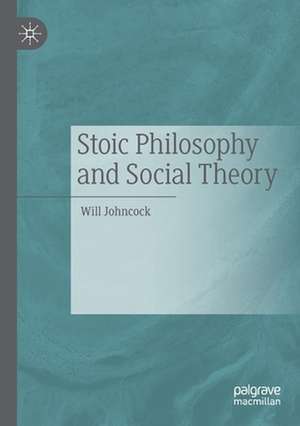Stoic Philosophy and Social Theory
Autor Will Johncocken Limba Engleză Paperback – 29 mai 2021
| Toate formatele și edițiile | Preț | Express |
|---|---|---|
| Paperback (1) | 586.05 lei 6-8 săpt. | |
| Springer International Publishing – 29 mai 2021 | 586.05 lei 6-8 săpt. | |
| Hardback (1) | 593.73 lei 6-8 săpt. | |
| Springer International Publishing – 29 mai 2020 | 593.73 lei 6-8 săpt. |
Preț: 586.05 lei
Preț vechi: 689.47 lei
-15% Nou
Puncte Express: 879
Preț estimativ în valută:
112.14€ • 119.92$ • 93.50£
112.14€ • 119.92$ • 93.50£
Carte tipărită la comandă
Livrare economică 17 aprilie-01 mai
Preluare comenzi: 021 569.72.76
Specificații
ISBN-13: 9783030431556
ISBN-10: 303043155X
Pagini: 352
Ilustrații: XI, 352 p.
Dimensiuni: 148 x 210 mm
Greutate: 0.48 kg
Ediția:1st ed. 2020
Editura: Springer International Publishing
Colecția Palgrave Macmillan
Locul publicării:Cham, Switzerland
ISBN-10: 303043155X
Pagini: 352
Ilustrații: XI, 352 p.
Dimensiuni: 148 x 210 mm
Greutate: 0.48 kg
Ediția:1st ed. 2020
Editura: Springer International Publishing
Colecția Palgrave Macmillan
Locul publicării:Cham, Switzerland
Cuprins
1. Introduction.- Essential Versus External Social Being.- Part I: Subjectivity.- 2. Who Controls Your Thoughts? Epictetus and Émile Durkheim on Mental Structure.- 3. When Are You Present? Chrysippus and Henri Bergson on Continuous Time.- 4. Why Do You Care About Yourself? The Early Stoics and Herbert Spencer on Self-Preservation.- Part II: Knowledges and Epistemologies.- 5. Do Preconceptions Determine New Knowledge? Epictetus and Max Weber on Truth.- 6. Do People Know Why They Travel? Seneca and Anthony Giddens on Ignorance.- Part III: Physical Conditions.- 7. Is Climate Change Natural? Marcus Aurelius and Barbara Adam on Death.- 8. What Causes Your Behaviors? Zeno and Pierre Bourdieu on the Body.- Part IV: Collective Ethics.- 9. How Do We Regulate Our Affection for Others? Hierocles and Claude Lévi-Strauss on Kinship Circles.- 10. Can Education Be Egalitarian? Musonius Rufus and Julia Kristeva on Gendered Labor.- 11. Is It Natural to Be Social? Marcus Aurelius and George Herbert Mead on Socialization.- Part V: Emotions.- 12. Is Reason External to Passion? Posidonius, Ann Game, and Andrew Metcalfe on Self-Division.- 13. Who Benefits from the Management of Feelings? Epictetus and Arlie Hochschild on Emotional Labor.- 14. How Individual Is Happiness? Chrysippus and Harriet Martineau on the Universal End.
Notă biografică
Will Johncock researches social theory, continental philosophy, and Stoic philosophy, with a particular interest in themes concerning time. He is the author of Naturally Late: Synchronization in Socially Constructed Times (2019) which studies how social science and philosophy differentiate natural time from human time structures. He has lectured at UNSW Sydney.
Textul de pe ultima copertă
This book puts recently re-popularized ancient Stoic philosophy in discussion with modern social theory and sociology to consider the relationship between an individual and their environment. Thirteen comparative pairings including Epictetus and Émile Durkheim, Zeno and Pierre Bourdieu, and Marcus Aurelius and George Herbert Mead explore how to position individualism within our socialized existence. Will Johncock believes that by integrating modern perspectives with ancient Stoic philosophies we can question how internally separate from our social environment we ever are. This tandem analysis identifies new orientations for established ideas in Stoicism and social theory about the mind, being present, self-preservation, knowledge, travel, climate change, the body, kinship, gender, education, and emotions.
Caracteristici
Offers original perspectives on social theory by way of comparison with the thoughts of Stoic philosophers Crosses disciplinary lines by combining philosophy and sociology Offers something different for all readers, from experienced scholars to the uninitiated
